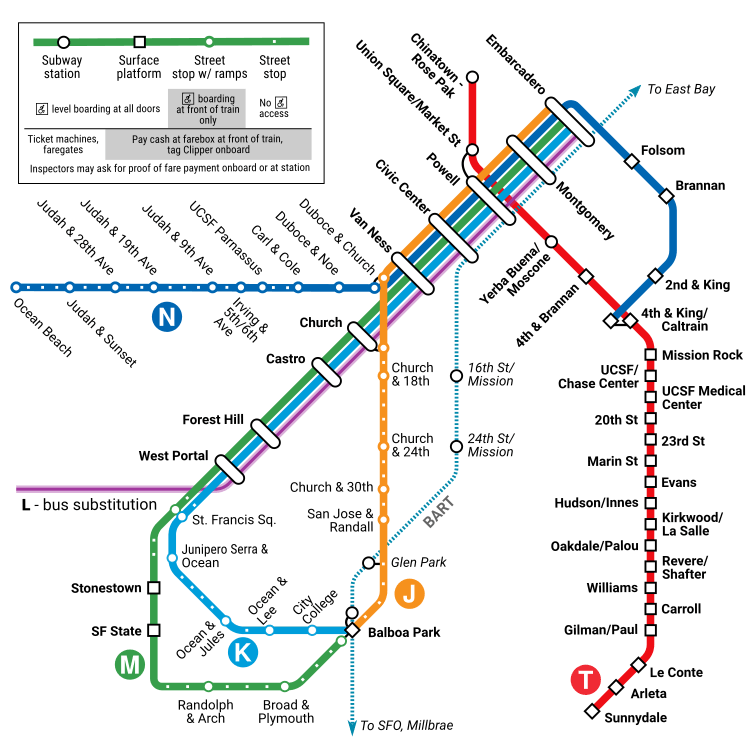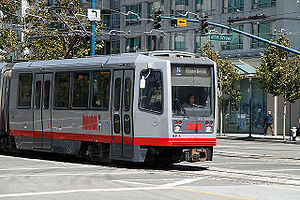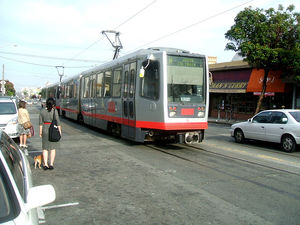Service begins from 5 a.m. on weekdays, 7 a.m. on Saturdays, and 8 a.m. on Sundays until 12 a.m. seven days a week.
Service during the early weekend morning, outside of owl service hours, is provided by surface buses.
Loading map...
{"format":"googlemaps3","type":"ROADMAP","minzoom":false,"maxzoom":false,"types":["ROADMAP","SATELLITE","HYBRID","TERRAIN"],"limit":500,"offset":0,"link":"all","sort":[""],"order":[],"headers":"show","mainlabel":"","intro":"","outro":"","searchlabel":"... further results","default":"","import-annotation":false,"width":"95%","height":"450px","centre":false,"title":"","label":"","icon":"Rail20.png","lines":[],"polygons":[],"circles":[],"rectangles":[],"copycoords":false,"static":false,"visitedicon":"","wmsoverlay":false,"zoom":false,"layers":[],"controls":["pan","zoom","type","scale","streetview","rotate"],"zoomstyle":"DEFAULT","typestyle":"DEFAULT","autoinfowindows":false,"resizable":false,"kmlrezoom":true,"poi":true,"cluster":false,"clustergridsize":60,"clustermaxzoom":20,"clusterzoomonclick":true,"clusteraveragecenter":true,"clusterminsize":2,"imageoverlays":[],"kml":[],"gkml":["https://www.transit.wiki/images/b/b8/Muni_Metro.kml"],"searchmarkers":"","fullscreen":false,"scrollwheelzoom":true,"showtitle":true,"hidenamespace":false,"template":"","userparam":"","activeicon":"","pagelabel":false,"ajaxcoordproperty":"","ajaxquery":"","locations":[{"text":"\u003Cb\u003E\u003Ca href=\"/20th_Street_station\" title=\"20th Street station\"\u003E20th Street station\u003C/a\u003E\u003C/b\u003E\u003Chr /\u003E\u003Ca href=\"/Property:Served_by\" title=\"Property:Served by\"\u003ELine\u003C/a\u003E: \u003Ca href=\"/T-Third_Street\" title=\"T-Third Street\"\u003ET-Third Street\u003C/a\u003E","title":"20th Street station","link":"","lat":37.760499,"lon":-122.388567,"icon":"/images/8/88/Rail20.png"},{"text":"\u003Cb\u003E\u003Ca href=\"/23rd_Street_Station_(San_Francisco)\" title=\"23rd Street Station (San Francisco)\"\u003E23rd Street Station (San Francisco)\u003C/a\u003E\u003C/b\u003E\u003Chr /\u003E\u003Ca href=\"/Property:Served_by\" title=\"Property:Served by\"\u003ELine\u003C/a\u003E: \u003Ca href=\"/T-Third_Street\" title=\"T-Third Street\"\u003ET-Third Street\u003C/a\u003E","title":"23rd Street Station (San Francisco)","link":"","lat":37.755378,"lon":-122.38801,"icon":"/images/8/88/Rail20.png"},{"text":"\u003Cb\u003E\u003Ca href=\"/2nd_%26_King_Station\" title=\"2nd \u0026amp; King Station\"\u003E2nd \u0026 King Station\u003C/a\u003E\u003C/b\u003E\u003Chr /\u003E\u003Ca href=\"/Property:Served_by\" title=\"Property:Served by\"\u003ELine\u003C/a\u003E: \u003Ca href=\"/N-Judah\" title=\"N-Judah\"\u003EN-Judah\u003C/a\u003E","title":"2nd \u0026 King Station","link":"","lat":37.779416,"lon":-122.390103,"icon":"/images/8/88/Rail20.png"},{"text":"\u003Cb\u003E\u003Ca href=\"/4th_%26_Brannan_Station\" title=\"4th \u0026amp; Brannan Station\"\u003E4th \u0026 Brannan Station\u003C/a\u003E\u003C/b\u003E\u003Chr /\u003E\u003Ca href=\"/Property:Served_by\" title=\"Property:Served by\"\u003ELine\u003C/a\u003E: \u003Ca href=\"/T-Third_Street\" title=\"T-Third Street\"\u003ET-Third Street\u003C/a\u003E","title":"4th \u0026 Brannan Station","link":"","lat":37.778671,"lon":-122.396963,"icon":"/images/8/88/Rail20.png"},{"text":"\u003Cb\u003E\u003Ca href=\"/4th_%26_King_Station\" title=\"4th \u0026amp; King Station\"\u003E4th \u0026 King Station\u003C/a\u003E\u003C/b\u003E\u003Chr /\u003E\u003Ca href=\"/Property:Served_by\" title=\"Property:Served by\"\u003ELine\u003C/a\u003E: \u003Ca href=\"/T-Third_Street\" title=\"T-Third Street\"\u003ET-Third Street\u003C/a\u003E","title":"4th \u0026 King Station","link":"","lat":37.776346,"lon":-122.394047,"icon":"/images/8/88/Rail20.png"},{"text":"\u003Cb\u003E\u003Ca href=\"/Arleta_Station\" title=\"Arleta Station\"\u003EArleta Station\u003C/a\u003E\u003C/b\u003E\u003Chr /\u003E\u003Ca href=\"/Property:Served_by\" title=\"Property:Served by\"\u003ELine\u003C/a\u003E: \u003Ca href=\"/T-Third_Street\" title=\"T-Third Street\"\u003ET-Third Street\u003C/a\u003E","title":"Arleta Station","link":"","lat":37.71233,"lon":-122.40203,"icon":"/images/8/88/Rail20.png"},{"text":"\u003Cb\u003E\u003Ca href=\"/Balboa_Park_Station\" title=\"Balboa Park Station\"\u003EBalboa Park Station\u003C/a\u003E\u003C/b\u003E\u003Chr /\u003E\u003Ca href=\"/Property:Served_by\" title=\"Property:Served by\"\u003ELine\u003C/a\u003E: \u003Ca href=\"/BART_Richmond_-_Millbrae\" title=\"BART Richmond - Millbrae\"\u003EBART Richmond - Millbrae\u003C/a\u003E","title":"Balboa Park Station","link":"","lat":37.721616,"lon":-122.447498,"icon":"/images/8/88/Rail20.png"},{"text":"\u003Cb\u003E\u003Ca href=\"/Brannan_Station\" title=\"Brannan Station\"\u003EBrannan Station\u003C/a\u003E\u003C/b\u003E\u003Chr /\u003E\u003Ca href=\"/Property:Served_by\" title=\"Property:Served by\"\u003ELine\u003C/a\u003E: \u003Ca href=\"/N-Judah\" title=\"N-Judah\"\u003EN-Judah\u003C/a\u003E","title":"Brannan Station","link":"","lat":37.783761,"lon":-122.388119,"icon":"/images/8/88/Rail20.png"},{"text":"\u003Cb\u003E\u003Ca href=\"/Carroll_Station\" title=\"Carroll Station\"\u003ECarroll Station\u003C/a\u003E\u003C/b\u003E\u003Chr /\u003E\u003Ca href=\"/Property:Served_by\" title=\"Property:Served by\"\u003ELine\u003C/a\u003E: \u003Ca href=\"/T-Third_Street\" title=\"T-Third Street\"\u003ET-Third Street\u003C/a\u003E","title":"Carroll Station","link":"","lat":37.725486,"lon":-122.394261,"icon":"/images/8/88/Rail20.png"},{"text":"\u003Cb\u003E\u003Ca href=\"/Castro_station\" title=\"Castro station\"\u003ECastro station\u003C/a\u003E\u003C/b\u003E\u003Chr /\u003E\u003Ca href=\"/Property:Served_by\" title=\"Property:Served by\"\u003ELine\u003C/a\u003E: \u003Ca href=\"/M-Ocean_View\" title=\"M-Ocean View\"\u003EM-Ocean View\u003C/a\u003E","title":"Castro station","link":"","lat":37.76249,"lon":-122.435607,"icon":"/images/8/88/Rail20.png"},{"text":"\u003Cb\u003E\u003Ca href=\"/Chinatown_-_Rose_Pak_Station\" title=\"Chinatown - Rose Pak Station\"\u003EChinatown - Rose Pak Station\u003C/a\u003E\u003C/b\u003E\u003Chr /\u003E\u003Ca href=\"/Property:Served_by\" title=\"Property:Served by\"\u003ELine\u003C/a\u003E: \u003Ca href=\"/T-Third_Street\" title=\"T-Third Street\"\u003ET-Third Street\u003C/a\u003E","title":"Chinatown - Rose Pak Station","link":"","lat":37.794806,"lon":-122.40822,"icon":"/images/8/88/Rail20.png"},{"text":"\u003Cb\u003E\u003Ca href=\"/Church_Station\" title=\"Church Station\"\u003EChurch Station\u003C/a\u003E\u003C/b\u003E\u003Chr /\u003E\u003Ca href=\"/Property:Served_by\" title=\"Property:Served by\"\u003ELine\u003C/a\u003E: \u003Ca href=\"/M-Ocean_View\" title=\"M-Ocean View\"\u003EM-Ocean View\u003C/a\u003E","title":"Church Station","link":"","lat":37.76749,"lon":-122.428964,"icon":"/images/8/88/Rail20.png"},{"text":"\u003Cb\u003E\u003Ca href=\"/Civic_Center/United_Nations_Plaza_Station\" title=\"Civic Center/United Nations Plaza Station\"\u003ECivic Center/United Nations Plaza Station\u003C/a\u003E\u003C/b\u003E\u003Chr /\u003E\u003Ca href=\"/Property:Served_by\" title=\"Property:Served by\"\u003ELine\u003C/a\u003E: \u003Ca href=\"/BART_Richmond_-_Millbrae\" title=\"BART Richmond - Millbrae\"\u003EBART Richmond - Millbrae\u003C/a\u003E","title":"Civic Center/United Nations Plaza Station","link":"","lat":37.779628,"lon":-122.413623,"icon":"/images/8/88/Rail20.png"},{"text":"\u003Cb\u003E\u003Ca href=\"/Embarcadero_Station\" title=\"Embarcadero Station\"\u003EEmbarcadero Station\u003C/a\u003E\u003C/b\u003E\u003Chr /\u003E\u003Ca href=\"/Property:Served_by\" title=\"Property:Served by\"\u003ELine\u003C/a\u003E: \u003Ca href=\"/BART_Richmond_-_Millbrae\" title=\"BART Richmond - Millbrae\"\u003EBART Richmond - Millbrae\u003C/a\u003E","title":"Embarcadero Station","link":"","lat":37.792808,"lon":-122.396922,"icon":"/images/8/88/Rail20.png"},{"text":"\u003Cb\u003E\u003Ca href=\"/Evans_Station\" title=\"Evans Station\"\u003EEvans Station\u003C/a\u003E\u003C/b\u003E\u003Chr /\u003E\u003Ca href=\"/Property:Served_by\" title=\"Property:Served by\"\u003ELine\u003C/a\u003E: \u003Ca href=\"/T-Third_Street\" title=\"T-Third Street\"\u003ET-Third Street\u003C/a\u003E","title":"Evans Station","link":"","lat":37.742718,"lon":-122.38793,"icon":"/images/8/88/Rail20.png"},{"text":"\u003Cb\u003E\u003Ca href=\"/Folsom_Station\" title=\"Folsom Station\"\u003EFolsom Station\u003C/a\u003E\u003C/b\u003E\u003Chr /\u003E\u003Ca href=\"/Property:Served_by\" title=\"Property:Served by\"\u003ELine\u003C/a\u003E: \u003Ca href=\"/N-Judah\" title=\"N-Judah\"\u003EN-Judah\u003C/a\u003E","title":"Folsom Station","link":"","lat":37.790444,"lon":-122.389546,"icon":"/images/8/88/Rail20.png"},{"text":"\u003Cb\u003E\u003Ca href=\"/Forest_Hill_station\" title=\"Forest Hill station\"\u003EForest Hill station\u003C/a\u003E\u003C/b\u003E\u003Chr /\u003E\u003Ca href=\"/Property:Served_by\" title=\"Property:Served by\"\u003ELine\u003C/a\u003E: \u003Ca href=\"/M-Ocean_View\" title=\"M-Ocean View\"\u003EM-Ocean View\u003C/a\u003E","title":"Forest Hill station","link":"","lat":37.748023,"lon":-122.459135,"icon":"/images/8/88/Rail20.png"},{"text":"\u003Cb\u003E\u003Ca href=\"/Gilman/Paul_station\" title=\"Gilman/Paul station\"\u003EGilman/Paul station\u003C/a\u003E\u003C/b\u003E\u003Chr /\u003E\u003Ca href=\"/Property:Served_by\" title=\"Property:Served by\"\u003ELine\u003C/a\u003E: \u003Ca href=\"/T-Third_Street\" title=\"T-Third Street\"\u003ET-Third Street\u003C/a\u003E","title":"Gilman/Paul station","link":"","lat":37.722409,"lon":-122.395649,"icon":"/images/8/88/Rail20.png"},{"text":"\u003Cb\u003E\u003Ca href=\"/Hudson/Innes_station\" title=\"Hudson/Innes station\"\u003EHudson/Innes station\u003C/a\u003E\u003C/b\u003E\u003Chr /\u003E\u003Ca href=\"/Property:Served_by\" title=\"Property:Served by\"\u003ELine\u003C/a\u003E: \u003Ca href=\"/T-Third_Street\" title=\"T-Third Street\"\u003ET-Third Street\u003C/a\u003E","title":"Hudson/Innes station","link":"","lat":37.739951,"lon":-122.388882,"icon":"/images/8/88/Rail20.png"},{"text":"\u003Cb\u003E\u003Ca href=\"/Kirkwood/La_Salle_Station\" title=\"Kirkwood/La Salle Station\"\u003EKirkwood/La Salle Station\u003C/a\u003E\u003C/b\u003E\u003Chr /\u003E\u003Ca href=\"/Property:Served_by\" title=\"Property:Served by\"\u003ELine\u003C/a\u003E: \u003Ca href=\"/T-Third_Street\" title=\"T-Third Street\"\u003ET-Third Street\u003C/a\u003E","title":"Kirkwood/La Salle Station","link":"","lat":37.737563,"lon":-122.389733,"icon":"/images/8/88/Rail20.png"},{"text":"\u003Cb\u003E\u003Ca href=\"/Le_Conte_Station\" title=\"Le Conte Station\"\u003ELe Conte Station\u003C/a\u003E\u003C/b\u003E\u003Chr /\u003E\u003Ca href=\"/Property:Served_by\" title=\"Property:Served by\"\u003ELine\u003C/a\u003E: \u003Ca href=\"/T-Third_Street\" title=\"T-Third Street\"\u003ET-Third Street\u003C/a\u003E","title":"Le Conte Station","link":"","lat":37.718535,"lon":-122.397791,"icon":"/images/8/88/Rail20.png"},{"text":"\u003Cb\u003E\u003Ca href=\"/Marin_Street_Station\" title=\"Marin Street Station\"\u003EMarin Street Station\u003C/a\u003E\u003C/b\u003E\u003Chr /\u003E\u003Ca href=\"/Property:Served_by\" title=\"Property:Served by\"\u003ELine\u003C/a\u003E: \u003Ca href=\"/T-Third_Street\" title=\"T-Third Street\"\u003ET-Third Street\u003C/a\u003E","title":"Marin Street Station","link":"","lat":37.749008,"lon":-122.387475,"icon":"/images/8/88/Rail20.png"},{"text":"\u003Cb\u003E\u003Ca href=\"/Mission_Rock_Station\" title=\"Mission Rock Station\"\u003EMission Rock Station\u003C/a\u003E\u003C/b\u003E\u003Chr /\u003E\u003Ca href=\"/Property:Served_by\" title=\"Property:Served by\"\u003ELine\u003C/a\u003E: \u003Ca href=\"/T-Third_Street\" title=\"T-Third Street\"\u003ET-Third Street\u003C/a\u003E","title":"Mission Rock Station","link":"","lat":37.77293,"lon":-122.389685,"icon":"/images/8/88/Rail20.png"},{"text":"\u003Cb\u003E\u003Ca href=\"/Montgomery_Station\" title=\"Montgomery Station\"\u003EMontgomery Station\u003C/a\u003E\u003C/b\u003E\u003Chr /\u003E\u003Ca href=\"/Property:Served_by\" title=\"Property:Served by\"\u003ELine\u003C/a\u003E: \u003Ca href=\"/BART_Richmond_-_Millbrae\" title=\"BART Richmond - Millbrae\"\u003EBART Richmond - Millbrae\u003C/a\u003E","title":"Montgomery Station","link":"","lat":37.78912,"lon":-122.4016,"icon":"/images/8/88/Rail20.png"},{"text":"\u003Cb\u003E\u003Ca href=\"/Oakdale/Palou_station\" title=\"Oakdale/Palou station\"\u003EOakdale/Palou station\u003C/a\u003E\u003C/b\u003E\u003Chr /\u003E\u003Ca href=\"/Property:Served_by\" title=\"Property:Served by\"\u003ELine\u003C/a\u003E: \u003Ca href=\"/T-Third_Street\" title=\"T-Third Street\"\u003ET-Third Street\u003C/a\u003E","title":"Oakdale/Palou station","link":"","lat":37.734387,"lon":-122.39086,"icon":"/images/8/88/Rail20.png"},{"text":"\u003Cb\u003E\u003Ca href=\"/Powell_Station\" title=\"Powell Station\"\u003EPowell Station\u003C/a\u003E\u003C/b\u003E\u003Chr /\u003E\u003Ca href=\"/Property:Served_by\" title=\"Property:Served by\"\u003ELine\u003C/a\u003E: \u003Ca href=\"/BART_Richmond_-_Millbrae\" title=\"BART Richmond - Millbrae\"\u003EBART Richmond - Millbrae\u003C/a\u003E","title":"Powell Station","link":"","lat":37.784588,"lon":-122.407334,"icon":"/images/8/88/Rail20.png"},{"text":"\u003Cb\u003E\u003Ca href=\"/Revere/Shafter_Station\" title=\"Revere/Shafter Station\"\u003ERevere/Shafter Station\u003C/a\u003E\u003C/b\u003E\u003Chr /\u003E\u003Ca href=\"/Property:Served_by\" title=\"Property:Served by\"\u003ELine\u003C/a\u003E: \u003Ca href=\"/T-Third_Street\" title=\"T-Third Street\"\u003ET-Third Street\u003C/a\u003E","title":"Revere/Shafter Station","link":"","lat":37.732053,"lon":-122.391676,"icon":"/images/8/88/Rail20.png"},{"text":"\u003Cb\u003E\u003Ca href=\"/SF_State_Station\" title=\"SF State Station\"\u003ESF State Station\u003C/a\u003E\u003C/b\u003E\u003Chr /\u003E\u003Ca href=\"/Property:Served_by\" title=\"Property:Served by\"\u003ELine\u003C/a\u003E: \u003Ca href=\"/M-Ocean_View\" title=\"M-Ocean View\"\u003EM-Ocean View\u003C/a\u003E","title":"SF State Station","link":"","lat":37.72166,"lon":-122.475177,"icon":"/images/8/88/Rail20.png"},{"text":"\u003Cb\u003E\u003Ca href=\"/Stonestown_Station\" title=\"Stonestown Station\"\u003EStonestown Station\u003C/a\u003E\u003C/b\u003E\u003Chr /\u003E\u003Ca href=\"/Property:Served_by\" title=\"Property:Served by\"\u003ELine\u003C/a\u003E: \u003Ca href=\"/M-Ocean_View\" title=\"M-Ocean View\"\u003EM-Ocean View\u003C/a\u003E","title":"Stonestown Station","link":"","lat":37.727437,"lon":-122.474883,"icon":"/images/8/88/Rail20.png"},{"text":"\u003Cb\u003E\u003Ca href=\"/Sunnydale_Station\" title=\"Sunnydale Station\"\u003ESunnydale Station\u003C/a\u003E\u003C/b\u003E\u003Chr /\u003E\u003Ca href=\"/Property:Served_by\" title=\"Property:Served by\"\u003ELine\u003C/a\u003E: \u003Ca href=\"/T-Third_Street\" title=\"T-Third Street\"\u003ET-Third Street\u003C/a\u003E","title":"Sunnydale Station","link":"","lat":37.709342,"lon":-122.404895,"icon":"/images/8/88/Rail20.png"},{"text":"\u003Cb\u003E\u003Ca href=\"/UCSF_Medical_Center_Station\" title=\"UCSF Medical Center Station\"\u003EUCSF Medical Center Station\u003C/a\u003E\u003C/b\u003E\u003Chr /\u003E\u003Ca href=\"/Property:Served_by\" title=\"Property:Served by\"\u003ELine\u003C/a\u003E: \u003Ca href=\"/T-Third_Street\" title=\"T-Third Street\"\u003ET-Third Street\u003C/a\u003E","title":"UCSF Medical Center Station","link":"","lat":37.764331,"lon":-122.388862,"icon":"/images/8/88/Rail20.png"},{"text":"\u003Cb\u003E\u003Ca href=\"/UCSF/Chase_Center_Station\" title=\"UCSF/Chase Center Station\"\u003EUCSF/Chase Center Station\u003C/a\u003E\u003C/b\u003E\u003Chr /\u003E\u003Ca href=\"/Property:Served_by\" title=\"Property:Served by\"\u003ELine\u003C/a\u003E: \u003Ca href=\"/T-Third_Street\" title=\"T-Third Street\"\u003ET-Third Street\u003C/a\u003E","title":"UCSF/Chase Center Station","link":"","lat":37.768827,"lon":-122.389291,"icon":"/images/8/88/Rail20.png"},{"text":"\u003Cb\u003E\u003Ca href=\"/Union_Square/Market_Street_Station\" title=\"Union Square/Market Street Station\"\u003EUnion Square/Market Street Station\u003C/a\u003E\u003C/b\u003E\u003Chr /\u003E\u003Ca href=\"/Property:Served_by\" title=\"Property:Served by\"\u003ELine\u003C/a\u003E: \u003Ca href=\"/T-Third_Street\" title=\"T-Third Street\"\u003ET-Third Street\u003C/a\u003E","title":"Union Square/Market Street Station","link":"","lat":37.786654,"lon":-122.406434,"icon":"/images/8/88/Rail20.png"},{"text":"\u003Cb\u003E\u003Ca href=\"/Van_Ness_Station\" title=\"Van Ness Station\"\u003EVan Ness Station\u003C/a\u003E\u003C/b\u003E\u003Chr /\u003E\u003Ca href=\"/Property:Served_by\" title=\"Property:Served by\"\u003ELine\u003C/a\u003E: \u003Ca href=\"/M-Ocean_View\" title=\"M-Ocean View\"\u003EM-Ocean View\u003C/a\u003E","title":"Van Ness Station","link":"","lat":37.775156,"lon":-122.41927,"icon":"/images/8/88/Rail20.png"},{"text":"\u003Cb\u003E\u003Ca href=\"/West_Portal_Station\" title=\"West Portal Station\"\u003EWest Portal Station\u003C/a\u003E\u003C/b\u003E\u003Chr /\u003E\u003Ca href=\"/Property:Served_by\" title=\"Property:Served by\"\u003ELine\u003C/a\u003E: \u003Ca href=\"/M-Ocean_View\" title=\"M-Ocean View\"\u003EM-Ocean View\u003C/a\u003E","title":"West Portal Station","link":"","lat":37.741206,"lon":-122.465554,"icon":"/images/8/88/Rail20.png"},{"text":"\u003Cb\u003E\u003Ca href=\"/Williams_Station\" title=\"Williams Station\"\u003EWilliams Station\u003C/a\u003E\u003C/b\u003E\u003Chr /\u003E\u003Ca href=\"/Property:Served_by\" title=\"Property:Served by\"\u003ELine\u003C/a\u003E: \u003Ca href=\"/T-Third_Street\" title=\"T-Third Street\"\u003ET-Third Street\u003C/a\u003E","title":"Williams Station","link":"","lat":37.72924,"lon":-122.392657,"icon":"/images/8/88/Rail20.png"},{"text":"\u003Cb\u003E\u003Ca href=\"/Yerba_Buena/Moscone_Station\" title=\"Yerba Buena/Moscone Station\"\u003EYerba Buena/Moscone Station\u003C/a\u003E\u003C/b\u003E\u003Chr /\u003E\u003Ca href=\"/Property:Served_by\" title=\"Property:Served by\"\u003ELine\u003C/a\u003E: \u003Ca href=\"/T-Third_Street\" title=\"T-Third Street\"\u003ET-Third Street\u003C/a\u003E","title":"Yerba Buena/Moscone Station","link":"","lat":37.782256,"lon":-122.401733,"icon":"/images/8/88/Rail20.png"}]}
Muni Metro stops at platform stations (see map above) and on-street stops (which resemble bus stops and are located every few blocks). Some on-street stops have boarding islands. Others have a sign on the curbside and require riders to board on the roadway. Motorists are required to stop before the Metro vehicles to allow riders to board.
On the train, announcements will be made for the next station (in the subway). Pull the stop cord by the windows to request a train stop. Except for underground stations, trains will skip stops if no one is waiting on the platform and no one has requested to disembark.
Muni Metro does not allow bicycles.
Even though Muni Metro is accessible, accessing the system is quite complicated given the various types of stations and stops on the system. Wheelchair riders should board at the front door of the front car.
At all underground stations, elevators are available between surface and concourse, and between the concourse and platform. Call Muni at 311 or (415) 554-6999 for updates on elevator availability. All surface stations that feature high-level platforms (like those on the T line) are accessible through ramps. For the rest of the system, select surface stops (see map above with bolded circles) provide wheelchair access through wayside wheelchair ramps. To board Muni at these stops, wait on the top of the ramp.



